Equities continued their climb last week with most indexes followed here gaining on the week. The exceptions were Malaysia’s KLCI, France’s CAC and Canada’s S&P/TSX Composite. Investors once again focused on the ups and downs in the process to resolve Greece’s fiscal woes along with the FOMC and Bank of Japan policy announcements. Little new economic data were available outside of the U.S. On Friday, equities in Europe and the U.S. were pressured by ‘quadruple witching’ and a surprise rate increase by the Reserve Bank of India.
Hopes that Greek fiscal woes may have been at least contained if not resolved have helped push many major stock indexes to multi-month peaks. But reports that Greece does not feel it can count on its eurozone partners to provide timely aid and might need the IMF have caused traders to check their recent ebullience.
Sentiment was bolstered by the Fed’s confirmation that it is in no rush to signal an interest rate increase. Some investors had been concerned that the rally could wobble if the Fed had suggested it was considering increasing rates sooner than the market anticipated. The FOMC left rates unchanged and also made little change in the language behind the decision, stating that economic activity continued to strengthen and the labor market is stabilizing. The Fed said that its remaining mortgage security purchases are near completion and will end in March as previously announced. The FOMC reiterated that economic conditions are likely to warrant low levels of the federal funds rate for an extended period.
|
|
2009 |
2010 |
% Change |
|
Index |
Dec 31 |
Mar 12 |
Mar 19 |
Week |
2010 |
| Asia |
|
|
|
|
|
|
| Australia |
All Ordinaries |
4882.7 |
4831.5 |
4890.1 |
1.2% |
0.2% |
| Japan |
Nikkei 225 |
10546.4 |
10751.3 |
10824.7 |
0.7% |
2.6% |
|
Topix |
907.6 |
936.4 |
948.9 |
1.3% |
4.6% |
| Hong Kong |
Hang Seng |
21872.5 |
21209.7 |
21370.8 |
0.8% |
-2.3% |
| S. Korea |
Kospi |
1682.8 |
1662.7 |
1686.1 |
1.4% |
0.2% |
| Singapore |
STI |
2897.6 |
2881.4 |
2915.7 |
1.2% |
0.6% |
| China |
Shanghai Composite |
3277.1 |
3013.4 |
3067.8 |
1.8% |
-6.4% |
|
|
|
|
|
|
|
| India |
Sensex 30 |
17464.8 |
17166.6 |
17578.2 |
2.4% |
0.6% |
| Indonesia |
Jakarta Composite |
2534.4 |
2666.5 |
2743.0 |
2.9% |
8.2% |
| Malaysia |
KLCI |
1272.8 |
1311.2 |
1296.6 |
-1.1% |
1.9% |
| Philippines |
PSEi |
3052.7 |
3072.9 |
3097.2 |
0.8% |
1.5% |
| Taiwan |
Taiex |
8188.1 |
7748.3 |
7897.9 |
1.9% |
-3.5% |
| Thailand |
SET |
734.5 |
733.3 |
744.6 |
1.5% |
1.4% |
|
|
|
|
|
|
|
| Europe |
|
|
|
|
|
|
| UK |
FTSE 100 |
5412.9 |
5625.7 |
5650.1 |
0.4% |
4.4% |
| France |
CAC |
3936.3 |
3927.4 |
3925.4 |
0.0% |
-0.3% |
| Germany |
XETRA DAX |
5957.4 |
5945.1 |
5982.4 |
0.6% |
0.4% |
|
|
|
|
|
|
|
| North America |
|
|
|
|
|
|
| United States |
Dow |
10428.1 |
10624.7 |
10742.0 |
1.1% |
3.0% |
|
NASDAQ |
2269.2 |
2367.7 |
2374.4 |
0.3% |
4.6% |
|
S&P 500 |
1115.1 |
1150.0 |
1159.9 |
0.9% |
4.0% |
| Canada |
S&P/TSX Comp. |
11746.1 |
12013.8 |
11948.0 |
-0.5% |
1.7% |
| Mexico |
Bolsa |
32120.5 |
32578.1 |
33022.8 |
1.4% |
2.8% |
 Stocks in Europe and the UK faded on Friday after the Reserve Bank of India unexpectedly raised interest rates. This prompted a shift away from riskier assets. The FTSE and DAX were up for the week anyhow, gaining 0.4 percent and 0.6 percent respectively. The CAC was virtually unchanged, losing 2 points. The CAC remains below its 2009 closing level by 0.3 percent while the FTSE is up 4.4 percent so far this year and the DAX has edged up 0.4 percent. The FTSE hit a fresh 21 month high on Friday before easing in the wake of the RBI announcement. Stocks in Europe and the UK faded on Friday after the Reserve Bank of India unexpectedly raised interest rates. This prompted a shift away from riskier assets. The FTSE and DAX were up for the week anyhow, gaining 0.4 percent and 0.6 percent respectively. The CAC was virtually unchanged, losing 2 points. The CAC remains below its 2009 closing level by 0.3 percent while the FTSE is up 4.4 percent so far this year and the DAX has edged up 0.4 percent. The FTSE hit a fresh 21 month high on Friday before easing in the wake of the RBI announcement.
The UK labour market report on Wednesday garnered investor attention during the week. It showed an improving labor market with the claimant count unemployment dropping sufficiently to lower the claimant count unemployment rate below 5 percent to 4.9 percent. The March ZEW also attracted attention but for the opposite reason as it continued to swoon. The result heightened caution about the German — and by extension — the EMU economies’ recoveries.
European markets vacillated as growing uncertainty about a rescue plan for debt-stricken Greece hit investor sentiment. Greek Prime Minister George Papandreou has said he may turn to the International Monetary Fund to overcome Greece's debt crisis unless leaders agree to set up a lending facility this coming week.
The Bank of England’s minutes of its March meeting revealed that the monetary policy committee voted unanimously to hold its policy interest rate at 0.5 percent and to halt any further monetary easing. However it noted that they had to keep a close watch on the public’s inflation expectations. MPC members discussed what they believe to be temporary pressures pushing inflation above its 2 percent target to 3.5 percent and concluded these are likely to remain for some months ahead.
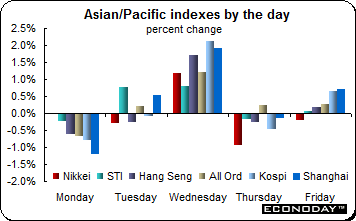 With the exception of the Malaysian KLCI, all indexes followed here were up last week with many finally climbing above their end of 2009 levels. The Nikkei and Sensex extended their positive weeks to six while the All Ordinaries recorded its third weekly gain. Stocks were up on increasing optimism about U.S. economy after jobless claims recorded a marginal decline and the Dow extended gains for eight successive days (through Thursday). Stocks in Hong Kong were up for the fourth week while Shanghai stocks finally recorded a gain after two down weeks. Positive trading across other markets in the region, including mainland China, also lifted market sentiment. With the exception of the Malaysian KLCI, all indexes followed here were up last week with many finally climbing above their end of 2009 levels. The Nikkei and Sensex extended their positive weeks to six while the All Ordinaries recorded its third weekly gain. Stocks were up on increasing optimism about U.S. economy after jobless claims recorded a marginal decline and the Dow extended gains for eight successive days (through Thursday). Stocks in Hong Kong were up for the fourth week while Shanghai stocks finally recorded a gain after two down weeks. Positive trading across other markets in the region, including mainland China, also lifted market sentiment.
Asian stocks rallied Wednesday after the Fed said once again that it would keep its policy fed funds rate in a range of zero to 0.25 percent for an extended period and the Bank of Japan doubled its short term lending program to fight deflation while keeping interest rates at a record low of 0.1 percent. Japanese stocks rose to an eight week high as investors welcomed the BoJ’s decision.
The Reserve Bank of Australia released the minutes of their March 2nd meeting. At that meeting, the RBA increased the policy cash rate to 4 percent. It was the fourth increase since October 2009. The minutes showed that the Board decided that recent evidence confirmed that it was appropriate for interest rates to move gradually towards normal levels — and that it was timely to take another step in that direction. While economic conditions in the major western economies remained soft, Asian economic growth was continuing to be strong. Domestically, most economic indicators continued to point to a strengthening in economic activity. Members noted the positive financial sector developments including early signs that credit to business was becoming easier after the difficult period last year. Members agreed that if the fiscal problems in Europe were not resolved satisfactorily, it could result in renewed market turmoil and fresh weakness in the global economy and this could have implications for Australia. But while such an outcome could not be ruled out, it was not the most likely one.
Bank of Japan still easing
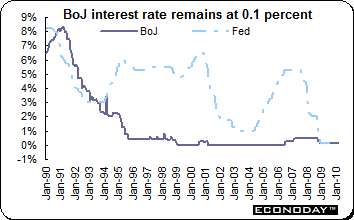 As expected the Bank of Japan left its key lending rate at just 0.1 percent where it has been since December 2008. The vote was unanimous. The monetary policy board decided also to expand the ¥10 trillion program of three month 0.1 percent loans that the BoJ began last December to ¥20 trillion. Two board members voted against raising the sum. As expected the Bank of Japan left its key lending rate at just 0.1 percent where it has been since December 2008. The vote was unanimous. The monetary policy board decided also to expand the ¥10 trillion program of three month 0.1 percent loans that the BoJ began last December to ¥20 trillion. Two board members voted against raising the sum.
The MPB kept its core economic assessment unchanged. It said that the economy was picking up mainly due to various policy measures taken at home and abroad although there is still not sufficient momentum to support a self-sustaining recovery in domestic private demand. It also said that financial conditions were improving. The BoJ said that the decline in business fixed investment has been coming to a halt. The Bank noted that although the CPI continues to decline, the rate of decline is moderating mainly reflecting developments in the prices of petroleum.
Since the MPB met in February, the government has continued to apply pressure on the BoJ to cooperate in defeating deflation. Finance Minister Naoto Kan has heated up the debate on whether the Bank should have a specific inflation target. He said that he wants to see price growth of 1 percent and that the government and the BoJ should work closely to achieve that end. For its part, the BoJ has been reluctant to adopt inflation targeting in part out of fear it may lose flexibility in operating its monetary policy.
In January, governor Shirakawa explained why he thought prices in Japan were falling and why monetary policy was the wrong tool to end the decline. He gave three reasons for a lack of demand that he said was the root cause of deflation. First, deregulation and low priced imports have put downward pressure on prices. Second, wages have fallen as an alternative to job cuts. Third, and in Mr Shirakawa’s view the most important factor, people expect less growth in the future because of the country’s aging and shrinking population.
Reserve Bank of India surprises
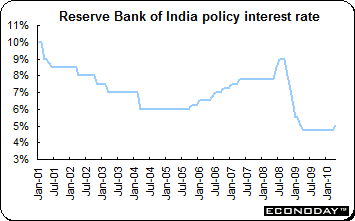 The Reserve Bank of India unexpectedly raised interest rates for the first time since July 2008 to 5 percent. It said that controlling prices has become ‘imperative’ after inflation accelerated to a 16 month high. The RBI increased the reverse repurchase rate to 3.5 percent from a record low 3.25 percent and the repurchase rate to 5 percent from 4.75 percent. The surprise decision comes a month before the bank’s scheduled monetary policy meeting. Wholesale price inflation data released earlier last week accelerated to an increase of 9.89 percent in February on the year, up from 8.56 percent growth in the previous month. The Reserve Bank of India unexpectedly raised interest rates for the first time since July 2008 to 5 percent. It said that controlling prices has become ‘imperative’ after inflation accelerated to a 16 month high. The RBI increased the reverse repurchase rate to 3.5 percent from a record low 3.25 percent and the repurchase rate to 5 percent from 4.75 percent. The surprise decision comes a month before the bank’s scheduled monetary policy meeting. Wholesale price inflation data released earlier last week accelerated to an increase of 9.89 percent in February on the year, up from 8.56 percent growth in the previous month.
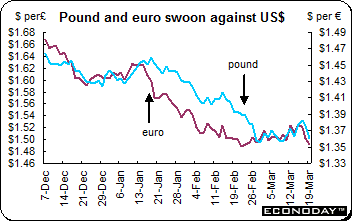 Both the euro and pound sterling were down against the U.S. dollar while the commodity currencies — the Canadian and Australian dollars — were up against their U.S. counterpart. Both the euro and pound sterling were down against the U.S. dollar while the commodity currencies — the Canadian and Australian dollars — were up against their U.S. counterpart.
The euro fluctuated with the news about Greece’s fiscal problems. Renewed worries over Greece were ignited as a spokesman from the German government said Greece should turn to the International Monetary Fund if it needed aid rather than its eurozone partners. The comments were followed by reports citing an unnamed Greek government official saying that, if no detailed rescue package was forthcoming from the European Union by the EU summit on March 25, Athens could turn to the IMF for assistance. In spite of a later denial from a Greek finance official, these developments were being viewed as an indication that negotiations for an EU aid package for Greece are not progressing quickly enough. Uncertainty surrounding the situation in Greece — as well as the possibility for it to again train focus on other fiscally stressed EU countries — maintains the potential for the euro to be pressured in the near term.
Sterling failed to hold earlier gains against the dollar after data showed the UK’s public finances were not in as bad a state as economists had feared. Figures revealed that the UK’s public sector net borrowing last month reached £12.4 billion, below the consensus estimate but still the highest total for any February on record. The pound strengthened on the announcement but struggled to hold its gains as investors dissected an otherwise gloomy report. Meanwhile, the pound rose as polls showed a rebound in support for the UK’s Conservative party ahead of the general election, expected in May. The prospect of a hung parliament in the UK has weighed on the pound in recent weeks, raising fears that an incoming government would lack authority to rein in the fiscal deficit.
Selected currencies — weekly results
|
|
2009 |
2010 |
% Change |
|
|
Dec 31 |
Mar 12 |
Mar 19 |
Week |
2010 |
| U.S. $ per currency |
|
|
|
|
|
|
| Australia |
A$ |
0.898 |
0.915 |
0.916 |
0.1% |
2.0% |
| New Zealand |
NZ$ |
0.727 |
0.701 |
0.709 |
1.0% |
-2.5% |
| Canada |
C$ |
0.955 |
0.982 |
0.984 |
0.2% |
3.0% |
| Eurozone |
euro (€) |
1.433 |
1.376 |
1.354 |
-1.6% |
-5.6% |
| UK |
pound sterling (£) |
1.617 |
1.519 |
1.502 |
-1.1% |
-7.1% |
|
|
|
|
|
|
|
| Currency per U.S. $ |
|
|
|
|
|
|
| China |
yuan |
6.827 |
6.826 |
6.827 |
0.0% |
0.0% |
| Hong Kong |
HK$* |
7.753 |
7.757 |
7.759 |
0.0% |
-0.1% |
| India |
rupee |
46.525 |
45.445 |
45.497 |
-0.1% |
2.3% |
| Japan |
yen |
93.125 |
90.460 |
90.560 |
-0.1% |
2.8% |
| Malaysia |
ringgit |
3.427 |
3.307 |
3.304 |
0.1% |
3.7% |
| Singapore |
Singapore $ |
1.405 |
1.393 |
1.398 |
-0.3% |
0.5% |
| South Korea |
won |
1164.000 |
1128.200 |
1132.800 |
-0.4% |
2.8% |
| Taiwan |
Taiwan $ |
31.985 |
31.747 |
31.743 |
0.0% |
0.8% |
| Thailand |
baht |
33.400 |
32.542 |
32.300 |
0.7% |
3.4% |
| Switzerland |
Swiss franc |
1.035 |
1.058 |
1.060 |
-0.2% |
-2.4% |
| *Pegged to U.S. dollar |
|
|
|
|
|
|
| Source: Bloomberg |
|
|
|
|
|
|
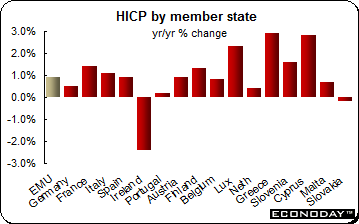 February harmonized index of consumer prices was up 0.3 percent and up 0.9 percent when compared with last year. Excluding food, drink, tobacco & petrol, the HICP was up only 0.8 percent on the year — a record low. HICP less seasonal foods & petrol was up 0.7 percent on the year. The dip in annual inflation from 1.0 percent in January reflected slower annual price increases in household equipment, health and transport. Declines here more than offset small gains in clothing and housing. February harmonized index of consumer prices was up 0.3 percent and up 0.9 percent when compared with last year. Excluding food, drink, tobacco & petrol, the HICP was up only 0.8 percent on the year — a record low. HICP less seasonal foods & petrol was up 0.7 percent on the year. The dip in annual inflation from 1.0 percent in January reflected slower annual price increases in household equipment, health and transport. Declines here more than offset small gains in clothing and housing.
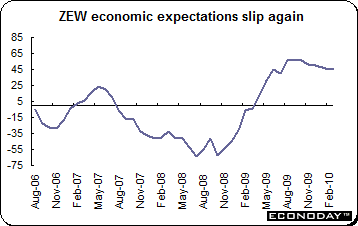 March ZEW indicates that analysts have a little more caution about prospects for the German economy. The expectations index slipped 0.7 points to 44.4 for its sixth consecutive decline. Expectations are now at their weakest level since May last year. The current conditions measure was up almost 3 points to minus 51.9, its 10th gain in a row and its best reading since November 2008. ZEW continues to expect the real economy to recover only slowly. The recent improvements posted by manufacturing output and orders were seen as promising but there was still a perceived risk of a private sector credit crunch. The biggest surprise to ZEW was the sharp pace at which inflation expectations were declining. March ZEW indicates that analysts have a little more caution about prospects for the German economy. The expectations index slipped 0.7 points to 44.4 for its sixth consecutive decline. Expectations are now at their weakest level since May last year. The current conditions measure was up almost 3 points to minus 51.9, its 10th gain in a row and its best reading since November 2008. ZEW continues to expect the real economy to recover only slowly. The recent improvements posted by manufacturing output and orders were seen as promising but there was still a perceived risk of a private sector credit crunch. The biggest surprise to ZEW was the sharp pace at which inflation expectations were declining.
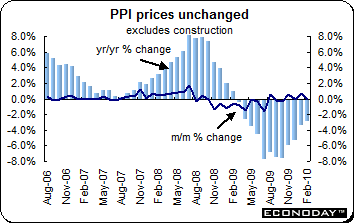 February producer price index was unchanged on the month and was down 2.9 percent when compared with a year ago. Core PPI was up 0.2 percent on the month and was down 0.6 percent on the year. Compared with January, the steepest rise was seen in basics (0.3 percent) followed by capital goods (0.1 percent). Prices of consumer goods however, were unchanged on the month. February producer price index was unchanged on the month and was down 2.9 percent when compared with a year ago. Core PPI was up 0.2 percent on the month and was down 0.6 percent on the year. Compared with January, the steepest rise was seen in basics (0.3 percent) followed by capital goods (0.1 percent). Prices of consumer goods however, were unchanged on the month.
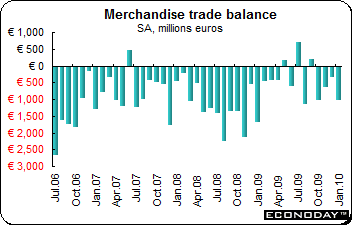 January seasonally adjusted merchandise trade deficit was €1.03 billion. The unadjusted deficit was considerably larger at €3.36 billion. The deterioration in the latest seasonally adjusted headline reflected a 1.6 percent monthly decline in exports and a 1.1 percent increase in imports. However, on the year, exports were up 1.0 percent versus a 0.3 percent drop in imports. Compared with January 2009, exports showed positive growth in just intermediates (4.5 percent) and especially energy (41.0 percent). Excluding energy, overall exports would have dropped 0.5 percent on the year. Hence, shipments of consumer goods dropped 3.1 percent with durables down 10.1 percent and nondurables off 1.4 percent. Capital goods exports dropped 3.1 percent. Intermediates imports were up 5.1 percent on the year while capital goods edged up 0.5 percent. But despite a 5.0 percent jump in consumer durables, a 5.5 percent decline in nondurables ensured that total consumer goods imports were down 4.2 percent on the year. January seasonally adjusted merchandise trade deficit was €1.03 billion. The unadjusted deficit was considerably larger at €3.36 billion. The deterioration in the latest seasonally adjusted headline reflected a 1.6 percent monthly decline in exports and a 1.1 percent increase in imports. However, on the year, exports were up 1.0 percent versus a 0.3 percent drop in imports. Compared with January 2009, exports showed positive growth in just intermediates (4.5 percent) and especially energy (41.0 percent). Excluding energy, overall exports would have dropped 0.5 percent on the year. Hence, shipments of consumer goods dropped 3.1 percent with durables down 10.1 percent and nondurables off 1.4 percent. Capital goods exports dropped 3.1 percent. Intermediates imports were up 5.1 percent on the year while capital goods edged up 0.5 percent. But despite a 5.0 percent jump in consumer durables, a 5.5 percent decline in nondurables ensured that total consumer goods imports were down 4.2 percent on the year.
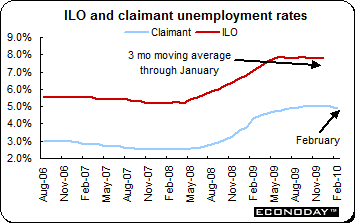 February claimant count unemployment dropped a steep 32,300, its third drop in the last four months and the largest monthly decline since August 1997. As a result, the claimant jobless rate edged a tick lower to 4.9 percent. The 23,500 increase in joblessness originally reported for January was revised to an increase of just 5,300. Moreover, the National Statistics Office maintains that there were probably no distortions caused by the bad weather. ILO unemployment slid a steep 54,000 during the three months to January and lowered the jobless rate to 7.8 percent. Annual average earnings growth in the three months to January was just 0.9 percent. Single month earnings were up only 1.0 percent from January 2009. Excluding bonuses the headline rate crept up to 1.4 percent from 1.2 percent but historically this remains exceptionally low. February claimant count unemployment dropped a steep 32,300, its third drop in the last four months and the largest monthly decline since August 1997. As a result, the claimant jobless rate edged a tick lower to 4.9 percent. The 23,500 increase in joblessness originally reported for January was revised to an increase of just 5,300. Moreover, the National Statistics Office maintains that there were probably no distortions caused by the bad weather. ILO unemployment slid a steep 54,000 during the three months to January and lowered the jobless rate to 7.8 percent. Annual average earnings growth in the three months to January was just 0.9 percent. Single month earnings were up only 1.0 percent from January 2009. Excluding bonuses the headline rate crept up to 1.4 percent from 1.2 percent but historically this remains exceptionally low.
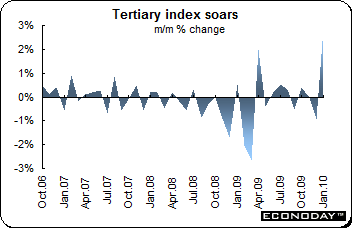 January tertiary sector index was up 2.9 percent but was down 0.3 percent on the year. The monthly increase was the first since October. The annual decline was the 18th drop in a row. The monthly increase came after December’s announcement that the government would extend the program which rewards consumers buying eco friendly household appliances and provides tax breaks on purchases of eco friendly vehicles to help prolong the effect of government spending programs. At the same time the unemployment rate unexpectedly fell which has helped buoy consumers' confidence. Monthly increases ranged from 6.1 percent for miscellaneous services and 5.2 percent for wholesale and retail trade to 0.3 percent for real estate & goods rental & leasing which was up 0.3 percent and accommodations, eating & drinking services which gained 0.1 percent. January tertiary sector index was up 2.9 percent but was down 0.3 percent on the year. The monthly increase was the first since October. The annual decline was the 18th drop in a row. The monthly increase came after December’s announcement that the government would extend the program which rewards consumers buying eco friendly household appliances and provides tax breaks on purchases of eco friendly vehicles to help prolong the effect of government spending programs. At the same time the unemployment rate unexpectedly fell which has helped buoy consumers' confidence. Monthly increases ranged from 6.1 percent for miscellaneous services and 5.2 percent for wholesale and retail trade to 0.3 percent for real estate & goods rental & leasing which was up 0.3 percent and accommodations, eating & drinking services which gained 0.1 percent.
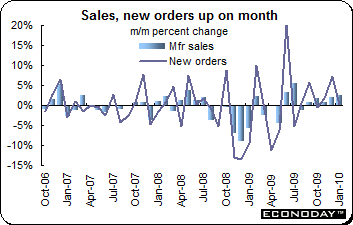 January manufacturing sales grew by 2.4 percent on the month, their fifth advance in succession and are now 10.0 percent higher on the year. The increase in nominal sales was almost matched by volumes which jumped 2.2 percent on the month and 9.5 percent on the year. The advance in nominal sales was broadly based among the major sectors with 17 of the 21 reporting industries noting increases. Leading the way on the month were plastic & rubber products (5.6 percent) and petroleum & coal products (3.4 percent), although the latter was mainly due to higher prices. By contrast, sales of transport equipment declined 0.5 percent despite a 0.9 percent gain in motor vehicles. Excluding the auto sector, sales surged 2.6 percent on the month and were 3.7 percent stronger versus January 2009. New orders edged up 0.2 percent on the month while backlogs gained 0.4 percent, their first back-to-back gain since 2008. January manufacturing sales grew by 2.4 percent on the month, their fifth advance in succession and are now 10.0 percent higher on the year. The increase in nominal sales was almost matched by volumes which jumped 2.2 percent on the month and 9.5 percent on the year. The advance in nominal sales was broadly based among the major sectors with 17 of the 21 reporting industries noting increases. Leading the way on the month were plastic & rubber products (5.6 percent) and petroleum & coal products (3.4 percent), although the latter was mainly due to higher prices. By contrast, sales of transport equipment declined 0.5 percent despite a 0.9 percent gain in motor vehicles. Excluding the auto sector, sales surged 2.6 percent on the month and were 3.7 percent stronger versus January 2009. New orders edged up 0.2 percent on the month while backlogs gained 0.4 percent, their first back-to-back gain since 2008.
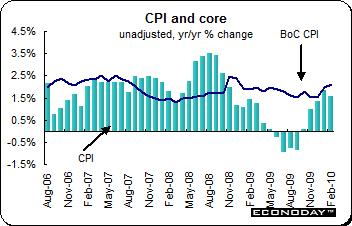 February consumer price index was up 0.4 percent and 1.6 percent when compared with last year. Excluding food and energy, the core CPI was up 0.7 percent and 1.4 percent on the year. The Bank of Canada’s preferred measure of underlying inflation which excludes eight volatile items also posted a 0.7 percent monthly gain to nudge its annual rate a tick higher at 2.1 percent. Seasonally adjusted overall consumer prices were up just 0.1 percent on the month. Within this, there were relatively sharp monthly gains in food (0.3 percent), household operations & furnishings (0.4 percent) and clothing & footwear (1.2 percent) where seasonal factors dominated. However, advances here were almost offset by declines in transportation (0.4 percent) and personal care health (0.1 percent). February consumer price index was up 0.4 percent and 1.6 percent when compared with last year. Excluding food and energy, the core CPI was up 0.7 percent and 1.4 percent on the year. The Bank of Canada’s preferred measure of underlying inflation which excludes eight volatile items also posted a 0.7 percent monthly gain to nudge its annual rate a tick higher at 2.1 percent. Seasonally adjusted overall consumer prices were up just 0.1 percent on the month. Within this, there were relatively sharp monthly gains in food (0.3 percent), household operations & furnishings (0.4 percent) and clothing & footwear (1.2 percent) where seasonal factors dominated. However, advances here were almost offset by declines in transportation (0.4 percent) and personal care health (0.1 percent).
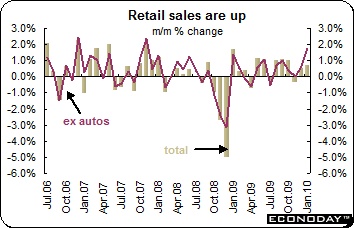 January retail sales were up 0.7 percent and up 6.0 percent when compared with last year. However, while cash sales impressed, the volume of purchases edged up a disappointingly sluggish 0.1 percent on the month. On the month, nominal sales were up in six of the main eight reporting sectors. Most significant among these was building & outdoor home supplies where purchases jumped 7.4 percent ahead of the expiry of the Home Renovation Tax Credit. Furniture, home furnishings & electrical goods were up 2.5 percent and there were gains also in food & drink (1.9 percent), miscellaneous retailers (1.1 percent) and clothing (0.5 percent). However, demand fell in the auto sector (1.5 percent) as a 6.0 percent slump in sales of used cars & parts combined with a 2.3 percent drop in new car purchases to more than offset a price-led 1.5 percent bounce in gasoline sales. Excluding this sector, retail sales were up 1.8 percent on the month and were 5.5 percent higher on the year. January retail sales were up 0.7 percent and up 6.0 percent when compared with last year. However, while cash sales impressed, the volume of purchases edged up a disappointingly sluggish 0.1 percent on the month. On the month, nominal sales were up in six of the main eight reporting sectors. Most significant among these was building & outdoor home supplies where purchases jumped 7.4 percent ahead of the expiry of the Home Renovation Tax Credit. Furniture, home furnishings & electrical goods were up 2.5 percent and there were gains also in food & drink (1.9 percent), miscellaneous retailers (1.1 percent) and clothing (0.5 percent). However, demand fell in the auto sector (1.5 percent) as a 6.0 percent slump in sales of used cars & parts combined with a 2.3 percent drop in new car purchases to more than offset a price-led 1.5 percent bounce in gasoline sales. Excluding this sector, retail sales were up 1.8 percent on the month and were 5.5 percent higher on the year.
Both the Federal Reserve and Bank of Japan left their interest rates unchanged at record lows while the Reserve Bank of India surprised with an intra-meeting increase. The surprise move sent equities lower as investors avoided risk. However, despite Friday’s slump in Europe and North America, equities were up for the most part last week with many indexes followed here climbing over their end of year levels. UK labor market data surprised on the upside as did Canadian manufacturing sales. Data continue to be mixed. On the negative side, the German ZEW weakened once again putting worries about the recovery’s strength on the front burner once again.
This week will be quiet on the economic data front. However, investors will continue to monitor the Greek fiscal situation. The Japanese fiscal year ends March 31st and investors will be making last minute adjustments to their portfolios if they already had not done so.
| The following indicators will be released this week... |
| Europe |
|
|
| March 23 |
UK |
Consumer Price Index (February) |
| March 24 |
Germany |
Ifo Survey (March) |
| March 25 |
EMU |
M3 Money Supply (March) |
|
France |
Consumption of Manufactured Goods (February) |
|
UK |
Retail Sales (February) |
|
|
|
| Asia/Pacific |
|
|
| March 24 |
Japan |
Merchandise Trade Balance (February) |
| March 26 |
Japan |
Consumer Price Index (February, March) |
|
|
|
Anne D Picker is the author of International Economic Indicators and Central Banks.
|

